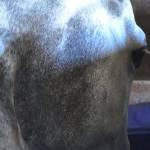Outlook: Cinnamon for Equine Health?

A recent flurry of research activity pertaining to the medical effects of cinnamon suggests the tasty spice could have benefits for horses.
“Cinnamon supplementation provides yet another example of a traditional herbal medicine making a comeback to benefit modern medical patients,” said Kathleen Crandell, Ph.D., a nutritionist for Kentucky Equine Research (KER).
Research* in this field revealed many potential health benefits associated with cinnamon, including:
- Antioxidant properties. These specialized molecules protect the body against a variety of degenerative processes caused by exuberant oxygen molecules, such as arthritis, neurodegenerative and autoimmune disorders, and cancer.
- Antidiabetic effects. Horses don’t develop type 2 diabetes like humans; however, they certainly suffer from similar glucose and insulin dysregulatory issues that contribute to insulin resistance and equine metabolic syndrome, both of which go hand in hand with laminitis.
- Antimicrobial activity. Cinnamon and other plant-derived products were used years ago to fight infections. In light of the growing population of antibiotic-resistant antibiotic strains, interest in plant products capable of warding off infection has renewed.
“Several studies have also shown that cinnamon may benefit human patients with gastric ulcers associated with the bacterium Helicobacter pylori. It is important to note, however, that ulcers in horse are not caused by H. pylori,” reminded Crandell.
No controlled research on the benefits of cinnamon to horses, other than insulin sensitivity, has been conducted. Because of this, there is no clear directive about if and how much cinnamon to give horses and in what form.
Research-proven supplements such as RiteTrac can help keep a horse’s entire gastrointestinal tract in optimal condition. RiteTrac contains ingredients that protect the stomach from ulceration and the hindgut from acidosis. While RiteTrac is available in the United States, look for these products in Australia and other countries.
Crandell adds, “Before adding, changing, or modifying any aspect of your horse’s diet, understand that important interactions between herbs and ingredients or nutrients exist**. Contact a veterinarian or KER nutritionist for a consultation today.”
*Ranasinghe, P., S. Pigera, G.A.S. Premakumara, et al. 2013. Medicinal properties of “true” cinnamon (Cinnamomum zeylanicum): A systematic review. BMC Complementary and Alternative Medicine. 13:275.
**Brancheau, D., B. Patel, M. Zughaib. 2015. Do cinnamon supplements cause acute hepatitis? American Journal of Case Reports. 16:250-254.








